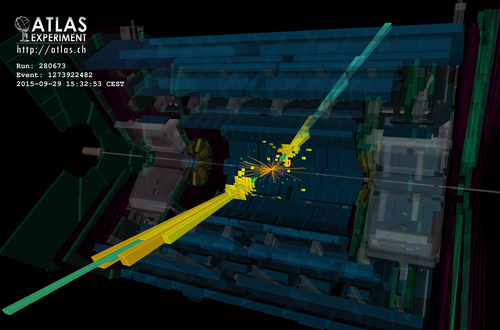Early Career Research: Searching for exotic new particles, by Dr Lydia Beresford
 Dr Lydia Beresford, Junior Research Fellow in Physics
Dr Lydia Beresford, Junior Research Fellow in Physics
Particle physicists are interested in understanding the properties of particles and how they interact with each other to produce the universe that we live in. All the matter around us is composed of particles. Take the human body for example, we are all composed of electrons, protons and neutrons. The protons and neutrons are composed of smaller particles called quarks and gluons, which, as far as we know, are not composed of any smaller constituents; we call such particles 'elementary'.
At the Large Hadron Collider (LHC) we study subatomic particles by accelerating
protons until they are travelling close to the speed of light, then collide
them together inside detectors deep underground. In these high energy
collisions energy is converted into mass producing particles which traverse our
detectors. The detectors record information about them, for instance their
energy and their direction, helping us to reconstruct what has happened. These
collisions occur millions of times per second, producing enormous amounts of
experimental data.
 My research involves analysing the data from the ATLAS detector at the LHC, in
order to search for the production of exotic new particles via their decay to
quarks or gluons. Each quark or gluon shows up in the detector as a collimated
spray of particles, called a jet, as shown in this image. If discovered, exotic
new particles could provide evidence for the creation of excited quarks,
indicating that quarks are made of smaller constituents, or quantum black
holes, which could indicate that gravity can propagate in additional hidden
dimensions. It could even potentially help us to understand what dark matter is
made from, if we discovered a particle which links dark matter to normal
matter.
My research involves analysing the data from the ATLAS detector at the LHC, in
order to search for the production of exotic new particles via their decay to
quarks or gluons. Each quark or gluon shows up in the detector as a collimated
spray of particles, called a jet, as shown in this image. If discovered, exotic
new particles could provide evidence for the creation of excited quarks,
indicating that quarks are made of smaller constituents, or quantum black
holes, which could indicate that gravity can propagate in additional hidden
dimensions. It could even potentially help us to understand what dark matter is
made from, if we discovered a particle which links dark matter to normal
matter.
Caption: A two jet (dijet) event in the ATLAS detector, from the production of two quarks or gluons.
In addition to searching for exotic new particles which decay to quarks or gluons, I am also planning to study the Higgs Boson through its decay to quarks, and to use it as a tool to search for new particles. The recent discovery of the existence of the Higgs Boson was one of the biggest scientific breakthroughs in particle physics. The Higgs Boson is an elementary particle which is closely associated to the Higgs field. Roughly speaking, the Higgs field is responsible for giving mass to elementary particles. Studying the Higgs Boson allows us to understand this field and therefore contributes to our understanding of the fundamental question of the origin of mass. The discovery of the Higgs Boson offers us the opportunity to measure its properties in order to investigate if it behaves as predicted by our theoretical model. It also opens up exciting possibilities to discover new particles which decay to Higgs Bosons, or even new kinds of Higgs Bosons.
New discoveries made in particle physics research may allow us to answer some
of the most fundamental questions in physics, ultimately enhancing our
understanding of the universe.